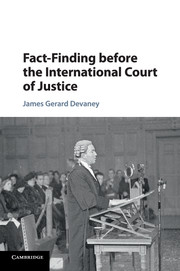Book contents
- Frontmatter
- Contents
- Table of cases
- Acknowledgements
- Introduction
- 1 Rules of evidence before the International Court of Justice
- 2 Criticisms of the Court's current reactive approach to fact-finding
- 3 The practice of other international courts and tribunals
- 4 Winds of change: the possibility of reform
- 5 A more proactive approach to fact-finding
- Epilogue
- Bibliography
- Index
1 - Rules of evidence before the International Court of Justice
Published online by Cambridge University Press: 05 September 2016
- Frontmatter
- Contents
- Table of cases
- Acknowledgements
- Introduction
- 1 Rules of evidence before the International Court of Justice
- 2 Criticisms of the Court's current reactive approach to fact-finding
- 3 The practice of other international courts and tribunals
- 4 Winds of change: the possibility of reform
- 5 A more proactive approach to fact-finding
- Epilogue
- Bibliography
- Index
Summary
This chapter evaluates the evidentiary provisions of the Court's Statute and Rules of Court and the fact-finding powers that the Court possesses in order to consider the extent to which it has utilised those powers in practice. It will be shown that whilst the Court in fact possesses relatively broad fact-finding powers, due to a number of factors it has never made use of them to any significant extent. Instead, the Court operates under extremely broad rules of admissibility of evidence that allow almost any piece of evidence to come before the Court that the State parties so choose. That the Court operates in this manner is to a large extent necessitated by the principles of State sovereignty and equality that espouse that States should be able to choose what evidence they place before the Court. Further, the Court is shackled by resource and time constraints that make independent fact-finding in each and every case largely impractical. As a result of its truncated fact-finding role, the Court's fact-assessment role takes on added significance, an issue examined in the second half of the chapter.
The development of the rules of evidence before the International Court of Justice
Rules of evidence and procedure before international courts and tribunals seek to enable them to establish a factual foundation upon which to base legal determinations, even where the parties before the tribunal cannot come to an agreement on the facts relating to the dispute. The provisions of the Court's Statute relating to evidence were adopted by the First Committee on Draft Statute during the United Nations Conference on International Organization (UNCIO), being ‘greatly facilitated’ by the Washington Committee of Jurists who had met prior to the San Francisco Conference from 9 to 20 April 1945 to undertake an article-by-article revision of the Statute of the Permanent Court of International Justice (PCIJ). The draft adopted by First Committee took the report of the Washington Committee of Jurists as the basis of its discussions and many articles (‘particularly those relating to procedure’) were taken over without substantial amendment. In fact, the following provisions relating to the Court's fact-finding powers were adopted at the UNCIO without amendment or deliberation, as the First Commission ‘unanimously approved without discussion, Articles 39–64 en bloc of draft Statute of the Committee of Jurists’.
- Type
- Chapter
- Information
- Fact-Finding before the International Court of Justice , pp. 14 - 72Publisher: Cambridge University PressPrint publication year: 2016



